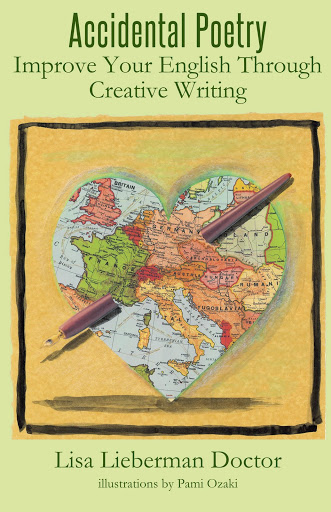Writing From The Heart While Learning English
The English department chairwoman at the Official Language School in Mallorca, Spain was skeptical about my one-day writing workshop. After all, the administration had never before seen creative writing used to improve English language skills, so they had no reason to believe it was an effective teaching method. Back home in Los Angeles, I had developed hundreds of writing prompts designed to give authors a deeper understanding of their characters. A writer might ask the protagonist, “What do you not want people to know about you?” or “How has compassion for others changed your life?”

I had traveled to Mallorca four times to use these exercises with new English speakers, and when news of the exciting results filtered over to the Official Language School, they asked me to spend a morning teaching their instructors, and an afternoon working with their students. I was cautioned to expect limited enrollment. But oh, how wrong they were! Eighteen enthusiastic instructors arrived, and their writing flowed effortlessly. English teacher Nancy Gelabert said this of the faculty’s reaction:
“We were so inspired by your talk that we ended up writing beautiful stories that we hadn’t thought ourselves capable of, and putting them into a collection. Your workshop was one of the highlights of our teaching experience.”
That afternoon, a whopping seventy-two students filed into the classroom that was far too small to accommodate them. They filled the seats, they sat along the window sill, the heating unit and the aisles. A microphone was brought in. I looked out at the sea of eager faces and asked them to choose one of six writing exercises, which ranged from the lighter emotional colors of serenity and forgiveness to the darker colors of fear and shame. I included a prompt about romantic relationships (“What do you see when you look into your partner’s eyes?”) and one about the nuclear family (“What was forbidden in your home?”). The students wrote with great fervor, then took the microphone to share their stories and their feelings in a language they were still in the process of learning.
Feeling a new surge of gratification, I continued my work with new English speakers. This past summer I led two writing workshops in Barcelona and its suburbs. Participants were given the choice of writing from the point of view of a fictional character, or from their own lives.
Anna Tomas Mayolas, a public administrator in Vilafranca del Penedes, said this about the workshop:
“I learned more about me, my writing and my English knowledge in one day than in years of living. Creative writing in a foreign language is a double way to improve, improve in writing skills and open a wide world in a language which you are not used (to), the world of emotions and feelings and the capacity to transmit them.”
Here’s an example of the deep writing Anna did that day:
"My son grew up without his father who disappeared after two months of tears. He was an easy baby, an easy child, clever, lovely and responsible, until the accident. I wasn’t even injured, he died. I filled up my life with memories, his little hands touching my face, his little feet kicking always a ball, his smile, his lovely voice demanding me. I had to invent memories that never had existed. I focused my life in painting dark and awful pictures, dark forests, wild landscapes, abstract horror forms, scaring figures…I held them all around the house, except my son’s bedroom, always full of light and good moments. Some people tried to come into my life, but it was impossible, the door was closed, my heart is closed."
Merce Sarrias, a playwright and television writer from Barcelona, said this about the workshop she attended: “(It) was a refuge in the middle of a hot month of loneliness.”
Merce did this fine writing in the workshop:
"Her brother had something she always lacked: the capacity of going through things without damage, accepting reality and not looking for more questions than the necessary ones. She was different. She went through things not listening very much, not watching very deeply, not arguing, not questioning, not opening herself to the world, because she was afraid of being hurt. Who was the coward?"
After working with hundreds of new English speakers and witnessing the joy they feel as they communicate from the heart, I compiled 237 writing exercises into a book called Accidental Poetry: Improve Your English Through Creative Writing. My intention, my dream, is to see the book augment traditional language learning. Writing and sharing our stories in a language we’re in the process of learning is a profoundly satisfying experience. It’s time to share it with the world!

Lisa Lieberman Doctor is the author of the writing book, Accidental Poetry: Improve Your English Through Creative Writing and the novel The Deflowering of Rhona Lipshitz. She has been working with writers since 1977. Over the years she has served as: a development and production executive at Universal Pictures, Warner Brothers, TriStar Pictures (where she was Vice President of Robin Williams' company, Blue Wolf Productions) and several independent production companies; a staff writer on ABC's General Hospital, where she was nominated for a Daytime Emmy and Writers Guild Award; an expert witness in motion picture copyright law; and a writing instructor at the UCLA Writers Program, the California State University, The Esalen Institute, The University of the Balearic Islands, and the TV Writers Fund For The Future.
Heart photo: Flickr cc: anniferrr, adapted by Wandering Educators





















